Summary:
The Portuguise can erect commercial posts by military
superiority. Center is Melaka and the Moluccan islands
Ternate, Tidore and Ambon (Amboina). Aceh becomes Muslim
center of the region, as an antagonist. The Dutch drive the
Portuguise back by absolutly criminal methods against the
population with mass murder and deportation in order to
secure the monopoly on nutmeg and clove. On Java the town
Batavia becomes Dutch center.
Michael Palomino, May 2005
1500
Palembang converts
to Islam. 1505
Trenggono,
grandson
of Raden Patah, becomes prince of Demak.
Local
powers on Java around 1500 included:
Demak
which was the chief power in Java in the early 1500s.
Nearby Jepara participated in many naval
expeditions.
Surabaya.
Some powers that later came under Surabaya include Gresik,
home of Sunan Giri, and Pasuruan.
Banten,
which was a Hindu power under Pajajaran until the arrival
of Sunan Gunungjati.
1509
Portuguese
visit Melaka for the first time.
The
goal of the Portuguese was to take control of trade. Later
trade empires would include Gowa, Banten, and the Dutch
VOC or East India Company. The original goal of all of
them was money before political power, but they did not
always stick to their original goal.
1511
April
Portuguese Admiral Albuquerque sets sail from Goa to
Melaka.
August
10 Albuquerque's forces take Melaka.
Sultan
of Melaka escapes to Riau.
Portuguese
in Melaka destroy a "Javanese" fleet. Their ship sinks
with treasure on way back to Goa.
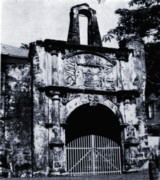
Portuguese fortress of Melaca / Malacca, entrance gate -
Portuguese colonialism
December Albuquerque sends three ships under
da Breu from Melaka to explore eastwards
The gate to the Portuguese
fortress at Melaka. Melaka was the center of the
Portuguese trade empire in the Indies in the 1500s. The
Portuguese in Melaka were attacked every few years by
the Sultans of Malaya and Sumatra, especially Aceh and
Johore. Sometimes alliances would be formed with powers
on Java to attack the Portuguese.
1512
Da
Breu expedition travels from Melaka to Madura, Bali,
Lombok, Aru and Banda. Two ships are wrecked at Banda.
Da Breu returns to Melaka; Francisco Serrão repairs ship
and continues to Ambon, Ternate, and Tidore. Serrão
offers support to Ternate in a dispute with Tidore--his
men build a Portuguese post at Ternate.
Serrão
wrote to Magellan at this time (who formerly served under
Albuquerque, but pledged allegiance to Spain after being
refused a promotion) telling Magellan about the riches of
the Indies.
A
force from Jepara and Palembang attacks the Portuguese
in Melaka, but is repulsed.
March Portuguese send an
envoy to King of Pajajaran. Portuguese are allowed to
build a fort at Sunda Kelapa (now Jakarta).
Portuguese
make contact with King Udara, son of Girindrawardhana
and ruler over the remnant of Majapahit.
Portuguese build factories at Ternate and Bacan.
Udara attacks Demak with the help of the King of
Klungkung on Bali. Majapahit forces are driven back, but
Sunan Ngudung falls in battle. Many more supporters of
Majapahit flee to Bali.
Powers
on Sumatra included:
Aceh, the first major
Islamic power in what is now Indonesia. It was founded
by local rulers of Lamuri, around today's Banda Aceh,
after they were expelled from Pedir (around today's
Sigli). After the fall of Melaka to the Portuguese, many
Muslim merchants moved their business operations to
Aceh, and this caused Aceh to grow as a trading power.
Palembang
where sultans still ruled long after the fall of
Srivijaya.
On
Kalimantan, Sukadana was a thriving city founded
by refugees from the fall of Majapahit.
1514
Ali Mughayat Syah is first Sultan of Aceh.
On Bali the King of
Gelgel (near today's Klungkung) was the most
powerful king in the 1500s.
1515
First
Portuguese visit Timor.
1518
Sultan
Mahmud of Melaka takes power at Johore.
Raden
Patah passes away; Yunus becomes Sultan of Demak.
The
Sultanate of Johore was attacked by the Portuguese all
through the 1520s.
1520
Aceh
begins taking northeast coast of Sumatra.
Balinese
attack on Lombok.
Portuguese
traders begin visiting Flores and Solor.
Banjar on
Kalimantan converts to Islam.
1521
Yunus
leads fleet from Demak and Cirebon against the
Portuguese in Melaka. Yunus is killed in battle.
Trenggono becomes Sultan of Demak.
Portuguese
take Pasai in Sumatra; Gunungjati leaves Pasai for
Mecca.
[Magellan]:
Last ship of Magellan expedition around the world [for
the king of Spain] sails between Lembata and Pantar
islands in Nusa Tenggara.
Sultan
Trenggono is remembered as a ruler who did much to spread
Islam throughout East and Central Java.
1522
February
Portuguese expedition under De Brito arrives on Banda.
May
De Brito expedition arrives at Ternate, builds a
Portuguese fort.
Banten,
still Hindu, asks for Portuguese help against Muslim
Demak.
[Magellan]:
Survivors of Magellan's expedition around the world
visit Timor.
Only
18 men survived Magellan's expedition, but they returned
to Spain with about a ton of cloves, enough to make them
wealthy for life.
The
arrival of Spanish ships was worrisome to the
Portuguese, however, who now had to deal with a European
competitor in the heart of the Spice Islands.
Portuguese
build fort at Hitu on Ambon.
1523
Gunungjati returns
from Mecca and settles at Demak, marries sister of Sultan
Trenggono.
1524
Gunungjati
and son Hasanuddin do both covert and overt missionary
work in West Java to weaken the kingdom of Pajajaran and
its alliance with the Portuguese. Local ruler of Banten,
formerly dependent on Pajajaran, converts to Islam and
joins Demak's side.
Aceh
takes Pasai and Pedir in northern Sumatra.
About
this time much of Java began to convert to Islam,
including Banten, Mataram and Central Java, and Surabaya.
1525
Hasanuddin, son of Gunungjati, does missionary work in
Lampung.
1526
Portuguese build
first fort on Timor.
1527
Demak
conquers Kediri, Hindu remnant of Majapahit state;
Sultans of Demak claims to be successors to Majapahit
claims; Sunan Kudus takes part.
Demak
takes Tuban.
Demak,
with help from Banten, takes Sunda Kelapa from
Pajajaran; renames it Jayakerta. (Credit is given to a
"Fatahillah"--or after the Portuguese mispronounciation,
"Falatehan"-- but this might be a name given to Sunan
Gunungjati.) Pajajaran Kingdom is pushed away from the
sea.
Kingdom
of Palakaran on Madura, based at Arosbaya (now
Bangkalan), converts to Islam under Kyai Pratanu.
Expeditions from Spain and
Mexico try to drive the Portuguese from Maluku.
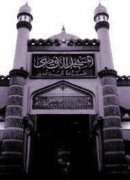
Masjid at Kudus, from the early 1500s.
Among the notable figures of this period are the Wali
Songo
or Nine
Walis.
See also Notes
on Islam in Modern Indonesia.
1529
Demak
conquers Madiun.
Kings
of Spain and Portugal agree that Maluku should belong to
Portugal, and the Philippines should belong to Spain.
Spain
and Portugal had divided the entire world between
themselves in 1494. They continued to argue for years over
the exact position of the dividing circle [because in 1494
Europe has no knowledge about the Indonesian islands of
today]. A 1524 conference sponsored by the Pope did not
settle matters.
1530
Salahuddin
is Sultan of Aceh.
Surabaya
and Pasuruan submit to Demak. Demak takes Balambangan,
the last Hindu state in easternmost Java.
Gowa
begins expanding from Makassar.
Banten
extends influence over Lampung.
1536
Major
Portuguese attack on Johore.
Antonio
da Galvão becomes governor of Portuguese post at
Ternate; founds Portuguese post at Ambon.
Portuguese
take Sultan Tabariji of Ternate to Goa due to suspicions
of anti-Portuguese activity, replace him with his brother.
1537
Acehnese
attack on Melaka fails. Salahuddin of Aceh is replaced by
Alaudin Riayat Syah I.
1539
Aceh attacks the Bataks to their south.
1540
Portuguese
in contact with Gowa.
Sultanate
of Butung founded.
1545
Demak conquers Malang.
Gowa
builds fort at Ujung Pandang [Makassar].
1546
Demak
invades Balambangan without success.
Trenggono
of Demak dies and is succeeded by Prawata. His
son-in-law Joko Tingkir expands power from Pajang (near
present Sukoharjo).
St.
Francis Xavier travels to Morotai, Ambon, and Ternate.
Around
this time Portuguese missionaries began to spread the
Catholic religion in Indonesia, especially in the east.
Today Catholicism is one of Indonesia's recognized
religions. 1547 Aceh attacks Melaka.
1550
Portuguese begin
building forts on Flores.
1551
Johore
attacks Portuguese Melaka with help from Jepara.
Force
from Ternate takes control of Sultanate of Jailolo on
Halmahera with Portuguese help.
1552
Hasanuddin
breaks away from Demak and founds Sultanate of Banten,
then takes Lampung for the new Sultanate.
Aceh
sends embassy to the Ottoman sultan in Istanbul.
1558
Leiliato
leads a force from Ternate to attack the Portuguese at
Hitu.
Portuguese
build a fortress on Bacan.
Ki
Ageng Pemanahan receives Mataram district from Joko
Tinggir, ruling at Pajang.
Smallpox
epidemic at Ternate.
1559
Portuguese
missionaries land at Timor.
Khairun
becomes Sultan of Ternate.
Sultan
Khairun was friendly to St. Francis Xavier, and was known
to be a skillful politician who manipulated the Portuguese
into doing what he wanted while claiming to be a
Portuguese ally. However, in the end the Portuguese threw
him in prison and tried to poison him when he would not
yield lands to them.
1560
Portuguese
found mission and trading post at Panarukan, in
easternmost Java.
Spanish
establish a presence at Manado.
1561
Sultan
Prawata of Demak passes away.
Portuguese
Dominican mission founded on Solor.
1564
Smallpox
epidemic at Ambon.
1565
Aceh
sacks Johore.
Kutai
on Kalimantan converts to Islam.
1566
Portuguese
Dominican
mission on Solor builds a stone fortress.
1568
Unsuccessful attack
by Aceh on Portuguese Melaka. 1569 Portuguese build wooden fortress on
Ambon island.
1570
Aceh
attacks Johore again, but fails.
Sultan
Khairun of Ternate signs a treaty of friendship with the
Portuguese, but is found poisoned the next day.
Portuguese agents are suspected. Babullah becomes Sultan
(until 1583), and vows to drive the Portuguese out of
their fortress.
Maulana
Yusup becomes Sultan of Banten.
1571
Alaudin Riayet Shah dies, disorder in Aceh until 1607.
1574
Jepara leads unsuccessful attack on Melaka.
1575
Sultan
Babullah expels the Portuguese from Ternate. Portuguese
build a fort on Tidore instead.
The
Portuguese in Ternate were under siege in their fortress
for five years, and never received help from Melaka or Goa
in India. 1576
Portuguese
build fort at the present site of the city of Ambon.
1577
Ki Ageng Pemanahan founds Kota Gede (near today's Yogya).
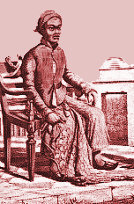 Sunan Kalijogo as portrayed in an old
engraving.
Sunan Kalijogo as portrayed in an old
engraving.
Banten
takes the remaining part of Pajajaran, converts it to
Islam.
November Sir
Francis Drake of England, after raiding Spanish ships and
ports in America, arrives at Ternate. Sultan Babullah, who
also hated the Spanish, pledges friendship to England.
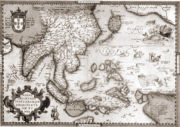 A Portuguese map from the late 1500s
showing the Indies in rough outlines - Portugal
colonialism
A Portuguese map from the late 1500s
showing the Indies in rough outlines - Portugal
colonialism
This information
was kept secret by the Spanish and Portuguese until
Dutch and English ships started to make trips to the
Indies just before 1600.
Some of the
subjects of the Pajajaran kingdom who did not convert to
Islam left for the high mountains, and became the Badui
people of West Java today.
1580
Maulana
Muhammad becomes Sultan of Banten.
Portugal
falls under Spanish crown; Portuguese colonial
enterprises are disregarded.
Drake
visits Sulawesi and Java, on the way back to England.
Ternate
takes control of Butung.
In
the 1500s, the Netherlands were an important business
center for Europe, where products from Russia,
Scandinavia, Africa, Asia and America were bought and
sold. The Netherlands during that time was ruled by Spain.
By 1581, the Netherlands had rebelled against the King of
Spain and had begun to govern themselves. But since Spain
now had control of the Portuguese colonies, the Spanish
could prevent Dutch businessmen from easy access to spices
from the Indies. This was one reason that Dutch ships
began to make their own voyages direct to the Indies in
the 1590s.
1581
About
this time, Kyai Ageng Pemanahan takes over Mataram
district (which had been promised to him by Joko Tingkir,
who delayed until Sunan Kalijogo of the Nine Walis pressed
him), changes name to Kyai Gedhe Mataram.
1584
Sutawijaya succeeds his father Kyai Gedhe Mataram as local
ruler of Mataram, ruling from Kota Gede.
1585
Sultan
of Aceh sends a letter to Elizabeth I of England.
Portuguese
ship sent to build a fort and mission on Bali is wrecked
just offshore.
1587
Sutawijaya
defeats Pajang and Joko Tingkir dies; lineage passes
definitely to Sutawijaya. Mount Merapi erupts.
Portuguese
in Melaka attack Johore.
Portuguese
sign a truce with the Sultan of Aceh.
Sir
Thomas Cavendish of England visits Java. 1588 Sutawijaya changes name
to Senopati; takes Pajang and Demak.
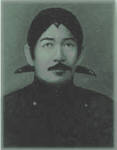 Senopati in a traditional portrait.
Senopati in a traditional portrait.
From Senopati
one can easily trace the lineage of today's Sultan of
Yogya and Susuhunan of Surakarta. Traditionally, the
line is traced back all the way to the kings of
Majapahit.
After this
point, the power in central Java was definitely in the
Mataram district, around today's Yogyakarta and
Surakarta, rather than around Demak.
1590
Original village of
Medan founded.
1591
Senopati
takes Madiun, then Kediri.
Sir
James Lancaster of England reaches Aceh and Penang, but
his mission is a failure.
Ternate attacks
Portuguese in Ambon.
1593
Ternate lays siege
to the Portuguese in Ambon again.
1595
April 2 Dutch expedition
under De Houtman leaves for Indies.
Many
Dutch sailors had worked on Spanish and Portuguese
ships. When De Houtman's Dutch expedition set sail,
there were experienced crewmen available to guide them
to the Indies.
Suriansyah
makes Banjar on Kalimantan a Sultanate (later
Banjarmasin).
Portuguese
build fort at Ende, Flores.
1596
June 5 De Houtman expedition
reaches Sumatra.
June 23 De Houtman expedition
reaches Banten. The initial reception is friendly, but
after some rough behavior by the Dutch, the Sultan of
Banten, along with the Portuguese stationed in Banten,
shell the Dutch ships.
The
De Houtman expedition continues along north coast of
Java. A ship is lost to pirates. More bad behavior leads
to misunderstandings and violence on Madura: a prince of
Madura is killed, several Dutch sailors are arrested and
taken prisoner, De Houtman has to ransom them for
release.
Abul
Mufakir becomes Sultan of Banten.
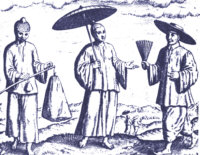 Three Chinese merchants at Banten, late
1500s.
Three Chinese merchants at Banten, late
1500s.
Some
members of De Houtman expedition settle on Bali and
refuse to leave.
A
Portuguese fleet under Lourenzo de Brito decides,
contrary to instructions, to seek retribution from the
Sultan of Banten for doing business with Dutch traders.
The fleet is defeated by Banten and forced to retreat.
Remnants
of the De Houtman expedition (89 of an original 248
sailors) return to Holland with spices.
Senopati
attacks Banten, but is driven back.
Title page from
the published account of the de Houtman expedition. The
Spanish and Portuguese had maintained secrecy about the
results of their explorations. The Dutch broke their
monopoly on information.
1598
22
Dutch ships in five expeditions set out for the east.
The Netherlands States-General suggests that competing
companies should merge. De Houtman's second expedition
includes John Davis, an English spy. Van Noort sets off
to sail around the southern tip of America to the
Indies.
Senopati
attacks the western territories of Surabaya.
The
De Houtman voyage was actually not profitable, (partly due
to de Houtman's own poor judgment and general
recklessness) but the businessmen of the Netherlands could
see the future potential in the spice trade, and dozens of
new voyages were planned to follow its path. This period
of is sometimes called the "wilde vaart".
1599
Dutch
expedition under Van Neck reaches Maluku, begins
successful trading on Banda, Ambon and Ternate.
June De Houtman is killed
in conflict with Sultan of Aceh.
Dutch
churches begin calls for missionary work in the Indies.
1600
Van
Noort expedition attacks Spanish at Guam.
Portuguese
establish trading post at Jepara.
Raja
of Minangkabau converts to Islam.
September
Dutch Admiral Van den Haghen makes an alliance with the
Hitu against the Portuguese in Ambon.
December
31 Elizabeth I of England charters East
India Company.
1601
Senopati
succeeded by Krapyak in Mataram.
Portuguese
send a fleet from Goa, India, to drive the Dutch from
the Indies.
English
set up fort at Banda.
Aceh
sends two ambassadors to Europe to observe and report on
the situation to the Sultan.
December
25-27 Five Dutch ships defeat the
Portuguese fleet of 30 ships in battle in Banten harbor.
1602
March 20
Dutch companies combine to form Vereenigde Oost-Indische
Compagnie (VOC); led by Heeren XVII representing
different regions of the Netherlands; States-General
[from the Netherlands] gives VOC power to raise armies,
build forts, negotiate treaties and wage war in Asia.
VOC
begins sending large, well-armed ships to the Indies (38
in the first three years).
VOC
establishes post at Gresik.
Sir
James Lancaster leads an (English) East India Company
expedition, reaches Aceh, and builds a trading post at
Banten.
The
Dutch East India Company was given most of the powers of
a sovereign state, partly because communication between
the Netherlands and Asia was so slow that colonial
activities simply could not be directed from Amsterdam.
(Until
1800 in this time-line, Dutch activities are marked [in
this timeline] with a VOC for East India Company).
1603
Official
VOC trading post founded at Banten. 1604 English
East India Company expedition under Sir Henry Middleton
visits Ternate, Tidore, Ambon, and Banda.
1605
Portuguese
at Ambon surrender to ships under VOC.
King
of Gowa converts to Islam, but other kings of the area
refuse invitation to convert. Gowa attacks its neighbors
and converts them to Islam.
VOC
sends expeditions to Banda, Irian Jaya [New Guinee],
northern Australia.
The
chief minister to the King of Gowa in these days was named
Matoaya. Besides presiding over the conversion of Gowa and
Makassar to Islam, he encouraged the establishment of
Makassar as a free port opposed to Portuguese or Dutch
control, and started a local industry to manufacture
firearms, to maintain Gowa's strength against outside
forces.
1606
Spanish
take Ternate and Tidore.
VOC
makes unsuccessful attack on Portuguese Melaka.
VOC
begins trading at Banjarmasin.
1607
Iskandar
Muda is Sultan of Aceh.
May Sultan of Ternate
appeals to the VOC for help against the Spanish.
Aceh
under Iskandar Muda and his successor, Iskandar Thani, was
a center of Islamic scholarship and debate.
1608
Gowa begins three years of war against the neighboring
Kingdom of Bone.
1609
Portuguese fortress on Bacan falls to VOC.
1610
Krapyak of Mataram starts period of heavy attacks on
Surabaya.
Post of Governor-General is created for VOC in Asia,
advised by Raad van Indie (Council of the Indies).
1611
English
begin setting up many posts in the Indies, including at
Makassar, Jepara, Aceh and Jambi.
Dutch
set up post at Jayakerta.
Gowa
conquers Bone, converts it to Islam.
1613
April 18
Dutch take Solor from Portuguese. Portuguese Dominicans
move headquarters to Larantuka, Flores.
Iskandar
Muda of Aceh defeats Johore, burns down the city,
carries away the Sultan of Johore and VOC
representatives.
Mataram
forces burn down Gresik; Krapyak asks VOC in Maluku for
help against Surabaya.
VOC
sets up post at Jepara.
VOC
sets up first post on Timor.
Krapyak
succeeded by Sultan Agung.
1614
Johore
throws out Aceh forces, creates alliance Palembang,
Jambi, and other Sultanates against Aceh
Aceh
wins naval battle against Portuguese at Bintan,
continues on to attack Melaka.
Agung
attacks Surabayan territories.
VOC
sends ambassador to Agung.
Bandung
founded.
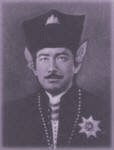
Sultan Agung in a traditional portrait
Agung was the
greatest ruler of Mataram. At one point, all of Java
except for Banten and Batavia was under his rule.
1615
VOC
closes post of Gowa, hostilities drag on for years.
First Dutch Reformed church in the east founded at
Ambon.
English
build warehouse at Jayakerta.
Dutch
abandon Solor after just two years.
Protestantism (Kristen),
one of Indonesia's five religions.
The
Dutch introduced the fifth of Indonesia's recognized
religions: Protestant Christianity. Beside the
missionary work on Java, there were soon many "orang
Kristen" around Manado on Sulawesi, in Ambon, and around
Kupang on Timor and nearby Roti.
The
VOC, being mostly a business, had very little interest in
spreading religion. However, it banned to practice of
Catholicism wherever it could.
1616
VOC military expedition against Banda.
1617
Aceh
takes Pahang.
Agung
defeats Surabaya at Pasuruan, defeats Surabayan
expedition to his rear; Pajang rebels, Agung destroys
Pajang and moves inhabitants to Mataram.
Gowa
extends control over Sumbawa.
"Monopolies"
and "smuggling" in these days were sometimes defined by
contracts and treaties, but at other times a "monopoly"
was simply declared unilaterally. Some of the
"smuggling" that occurred would just be called
"competition" today.
In
1615-1616, the Schouten expedition became the first to
sail around Cape Horn at the the southern tip of South
America, then made the first visit by Europeans to many
south Pacific islands. By the time they arrived in
Batavia (Jakarta), Coen had them jailed for violating
the V.O.C.'s monopoly, and confiscated their ships.
(Years
later, in 1722, the Dutch explorer Roggeveen would run
into the same trouble after discovering Easter Island.)
1618
Jan
Pieterzoon Coen becomes Governor-General of VOC.
English
merchants attack Chinese ships in Banten in a dispute
over the price of pepper. Coen begins secretly
fortifying the VOC warehouses at Jayakerta to the east.
December
Sultan of Banten encourages English to drive Dutch out
of Jayakerta. Coen leaves for Maluku to muster ships and
soldiers.
Agung
bans the sale of rice to the VOC. Agung's governor of
Jepara attacks the VOC post there; Dutch burn down much
of Jepara in retaliation.
Dutch
reoccupy Solor.
1619
January English force Dutch
surrender at Jayakerta, but Banten forces take over from
the English in a surprise move. The English and the
Pangeran of Jayakerta retreat.
March 12
Dutch rename post at Jayakerta to Batavia [later the
Dutch center of the Netherland Indies], (today's
Jakarta).
May Coen passes through
Jepara, and burns down the city again, including the
English trading post.
May 28 Coen arrives at
Jayakerta, and burns down the original town of
Jayakerta, leaving only the Dutch post of Batavia
remaining to become VOC headquarters.
Agung
takes Tuban from Surabaya, destroying the city.
August VOC begins building
city at Batavia.
Agung
was not pleased with the Dutch taking Jayakerta, since he
had intended to take it himself. Likewise, the Sultan of
Banten did not want the English to take it, for the same
reason.
1620
VOC under Coen almost exterminates
population of Banda to prevent "smuggling". Survivors
settle on small islands near Seram.
Aceh
takes Kedah.
Gowa
extends influence over Sumbawa.
Rahmatullah
becomes Sultan of Banjar on Kalimantan.
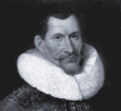 Jan Pieterszoon Coen, worst mass
murderer and mass killer, the most aggressive
Governor-General of the V.O.C. -
Holland colonialism in Indonesia
Jan Pieterszoon Coen, worst mass
murderer and mass killer, the most aggressive
Governor-General of the V.O.C. -
Holland colonialism in Indonesia
One of Coen's
goals was to make the VOC strong enough on its own that
it did not have to depend on the goodwill of neighboring
rulers. He intended to do this by changing the VOC from
a trade empire to an empire that ruled actual
territories, then settling those territories with
colonists from the Netherlands. Military strength was
important, both for maintaining a position of power
among the local kings and sultans, and for keeping the
Spanish, Portuguese and English away.
For Coen, the
VOC was more than a business, but for neighboring
rulers, such as Sultan Agung, and even for government
officials in China, the VOC were mere merchants, and
they refused to give VOC officials the same standing in
protocol that they gave the representatives of other
kings or sultans.
1621
British
found trading post at Ambon.
1622
Mataram
navy defeats Sukadana (an ally of Surabaya in West
Kalimantan), and destroy the city.
Agung
and VOC make overtures to each other.
1623
VOC agents in Ambon arrest, torture and
execute English agents on charges of conspiracy.
[This
murder action is used by the English propaganda against
the Netherlands yet for a long time].
Aceh
sacks Johore.
Carstenz
expedition for VOC explores southern coast of Irian
Jaya.
Coen
returns to the Netherlands. Carpentier is new
Governor-General of the VOC.
VOC
takes nominal claim to Aru Islands.
1624
Aceh takes Nias.
Sultan Agung conquers Madura, and takes 40,000 prisoners.
Raden Praseno, a grandson of Pratanu, is named Pangeran
Cakraningrat I of Madura by Agung.
1625
Agung
dams Brantas River to cut off water supply from
Surabaya, which finally surrenders.
Cirebon
is an ally of Agung.
Epidemics
and ruin of war spread through Java.
Abul
Fath becomes Sultan of Banten.
In
1625 the first "hongi" raids took place in Maluku. These
were attacks, usually by local allies of the VOC,
against anyone who was growing cloves without
authorization of the VOC.
By
this time, the VOC was probably the largest business
enterprise anywhere in the world, with tens of thousands
of employees. The territories controlled by the VOC were
not only in Indonesia: in the mid-1600s, they also
included Sri Lanka, Taiwan, and the Cape area in what is
now South Africa. The VOC also had "factories", warehouses
and offices in Thailand, Japan, Iran, Yemen, and Canton in
China.
1627
Coen
returns from the Netherlands to serve as
Governor-General of the V.O.C. again.
December 25
Soldiers from Banten infiltrate the fortress of Batavia,
kill some guards, and escape, but do little damage.
Around
this time, Sultan Agung forced the removal of the entire
population of many villages in the Priangan (around
today's Bandung) for disobedience. Around 1200 men were
sent back to Mataram from these villages, and executed.
1628
Agung
sends army against VOC in Batavia; dams Ciliwung River
in attempt to deny fresh water to the VOC. He fails to
oust the Dutch, who prevent his army from receiving
supplies by sea. Commanders of the Mataram army are
executed for failure.
Last
of the English leave Banda.
1629
Agung
attacks Batavia again. He is defeated, although Coen
dies during the siege.
Banten,
fearing Agung now more than the VOC, pleads for peace
with the VOC.
Iskandar
Muda sends navy of Aceh against Portuguese Melaka, but
the Aceh navy is destroyed.
September 20
Coen passes away.
Introduction
of sugar cultivation in Banten.
1630
Dutch abandon Solor, which is retaken by the Portuguese.
1631
Agung suppresses rebellion at Sumedang.
1633
Agung
raids east Java; the Hindu kingdom of Balambangan asks
for VOC help and is refused. Balambangan then asks the
King of Gelgel in Bali for help.
War
between VOC and Banten.
Aceh
takes the Indrapura area of Minangkabau.
1634
Dutch arrest Kakiali, leader of Hitu in
Maluku, on charges of smuggling.
This was the
"mercantilist" age of trade empires. There were many
powers that wanted to create trade empires: the Dutch
through the VOC, the English, Banten, and Gowa were among
them. There was no such thing as "free trade" under these
empires. The VOC especially wanted total control of trade,
and any selling to anyone outside the VOC was considered
"smuggling".
1635
Agung
tries to take Balambangan, but is defeated by Balinese
forces.
VOC
signs treaty with Kutai on Kalimantan.
1636
Iskandar Thani
becomes Sultan of Aceh; supports Islamic learning.
Agung
begins conquest of easternmost Java.
Agung
suppresses a revolt in Giri.
Agung,
realizing that he cannot defeat Dutch, makes overtures
towards VOC.
Van
Diemen becomes Governor-General of VOC.
Portuguese
abandon posts on Solor after six years.
VOC
bans all private correspondence (until 1701).
1637
VOC
attacks Ternate.
VOC
releases Kakiali, who pledges friendship to VOC but
makes anti-Dutch alliance between Hitu, Ternate, and
Gowa.
Local
Muslims overcome Portuguese fortress at Ende on Flores.
Agung
gives permission for Portuguese and Catholic refugees
from Batavia to settle around Jepara.
Agung
finally takes Balambangan in easternmost Java. The area
is devastated by warfare.
Palembang
and Banjarmasin send ambassadors to make homage to
Agung.
Ar-Raniri
arrives in Aceh from Gujarat in India.
Around
this time the VOC started pushing the Portuguese out of
many of their posts in Nusa Tenggara.
Ar-Raniri
was a great writer and scholar in Aceh's golden age. Among
other things, he wrote "Garden of Kings", a book about
Islam and the scientific knowledge of the day. However, he
was also a controversial figure in Aceh, and he returned
to India in 1644.
1639
Chief
minister Matoaya of Gowa is succeeded by his son
Pattingalloang.
Unlike
his father, Pattingalloang did not maintain good relations
with the Bugis. The bad feeling would eventually lead some
Bugis to side with the VOC against Gowa and Makassar.
1640
Bima
on Sumbawa converts to Islam and becomes a Sultanate.
Portugal
regains independent crown from Spain.
Portuguese
abandon trading post at Jepara.
Cirebon
becomes a dependency of Mataram
1641
Taj
ul-Alam becomes Sultana of Aceh, starts period of female
rulers; Johore and Aceh settle differences.
January 14 VOC
takes Melaka from Portuguese, with help from the Sultan
of Johore.
Sultan
of Johore opens ports in Riau to all traders.
Kakiali
and Hitu attack VOC on Ambon.
The
VOC takeover of Melaka was the real end of Portuguese
importance in the region. But after losing Melaka, some
Portuguese started trading with Gowa on Sulawesi
[Celebes].
After
Taj ul-Alam became ruler of Aceh, the centralized power
in Aceh lessened, regional ruler gained more power, and
Aceh's tributaries began to show their independence.
With
the English and Portuguese almost gone, and Batavia and
Ambon relatively secure from neighboring rulers, this was
the most profitable time for the VOC.
1642
VOC
gets monopoly on trade with Palembang by treaty.
Hidayatullah
becomes Sultan of Banjar on Kalimantan.
Tasman
explores coasts of Irian Jaya [New Guinee] for VOC on
voyage back from New Zealand.
"Statutes
of Batavia", based on Roman law, are introduced as a legal
[racistic] code for VOC territories.
1643
VOC has Kakiali murdered, continue drive to take Hitu.
1645
Agung
begins building royal tombs at Imogiri, (near today's
Yogya).
Mandarsyah
becomes Sultan of Ternate with VOC help.
VOC
established outpost at Perak.
1646
Sultan
Agung dies, and is succeeded by Susuhunan Amangkurat I.
Mataram controls all Java, more or less, except Banten
and Batavia. Relations between Amangkurat I and the VOC
are good in the beginning.
VOC
finally takes Hitu.
Dutch
arrive again on Solor, abandoned by the Portuguese ten
years earlier.
September 24
Cooperation treaty between VOC and Mataram, involving
promises of mutual assistance against enemies and
extradition of runaway debtors, among other things.
Ships of Mataram may trade at any VOC port except Ambon,
Ternate or Banda, but must apply for a pass at Batavia
if they are sailing for Melaka or points beyond.
Portuguese
begin building a settlement at the present site of
Kupang on western Timor.
VOC
builds a trading post in the Tanimbar Islands.
1647
Amangkurat
I moves court to Plered near Karta.
Mataram
kingdom loses Balambangan in easternmost Java to Balinese
forces.
1648
Cakraningrat II takes power in Madura, under Mataram.
1650
VOC
intervenes in uprising against Sultan Mandarsyah of
Ternate, sparking civil war.
Amangkurat
I orders Cirebon to attack Banten.
Musta'in
Billah becomes Sultan of Banjar on Kalimantan.
1651
VOC reopens post at Jepara; Amangkurat I begins
interfering in coastal trade.
Sultan
Ageng begins rule at Banten (not to be confused with
Sultan Agung of Mataram).
VOC
takes Kupang on western Timor; Portuguese move to Lifau,
in what is now East Timor.
VOC
outpost at Perak is destroyed.
1652
VOC
takes Sultan Mandarsyah of Ternate to Batavia, makes him
sign agreement not to grow cloves, starts military moves
against opposing faction in Ternate.
Amangkurat
I bans the export of rice or timber.
Hongi
raids destroy clove cultivation on Buru.
Tensions
grow between the VOC and Gowa.
1655
Amangkurat I orders that no boats of any kind shall set
sail from his ports.
1656
VOC deports population of Hoamoal near Ternate to Ambon.
1657
Amangkurat
I attacks Banten again.
VOC
forces population of Buru to relocate to Kaleji Bay.
1658
VOC
sets up post at Manado.
War
between VOC and Palembang.
1659
VOC
forces burn down Palembang, and reestablish the VOC
post.
Amangkurat
I has several family members murdered, including the
mother of the future Amangkurat II.
July 10 Treaty between VOC
and Banten: prisoners and runaway slaves are to be
exchanged; VOC receives a presence at Banten free from
rent or taxes; boundary between Banten and VOC territory
is set.
VOC
builds fort in the Aru Islands, but soon abandons it.
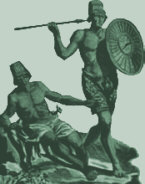
Bugis fighters from a 1650s engraving. Indonesia, Dutch
Indies
VOC
attacks Gowa, destroys Portuguese ships in harbor, and
forces peace treaty on Sultan Hasanuddin of Gowa.
Arung
Palakka of Bone rebels against Gowa; retreats with
supporters to Butung.
Buleleng
begins drive to become power on Bali; King of Klungkung
remains as "Dewa Agung" or chief king.
Amangkurat
I closes ports again; VOC leaves Jepara.
Formerly
Bali had answered to the King at Gelgel. Around this
time, the kingdom split into nine states:
Badung
Bangli
Buleleng
Gianyar
Jembrana
Karangasem
Klungkung
Mengwi
Tabanan
1661
Court
rebellion against Amangkurat I.
Banten
takes diamond-bearing area of Landak on Kalimantan.
Amangkurat
I had a reputation for being cruel and unpredictable.
Besides his disastrous interference in the economy, at
one time he had many of the Islamic scholars in Mataram
killed, then took their former judicial powers for
himself, turning himself into an absolute ruler.
1662
Portuguese
headquarters in the east is moved from Larantuka, Flores
to Lifau (today Oecussi or Pantemakassar) in what is now
East Timor.
VOC
signs treaty with chiefs on Roti.
1663
Spanish
abandon post at Tidore.
VOC
allows Arung Palakka and followers to settle at Batavia.
Banten
begins direct trade with Manila.
July 6 Treaty of Painan:
coastal areas of Minangkabau, including Padang, become a
protectorate of the VOC, which guarantees them security
against raids from Aceh.
By
the end of the 1660s, Banten was trading directly with
China, Japan, Thailand, India and Arabia, using its own
ships to compete with English, French, Danish and VOC
traders. Sultan Ageng of Banten was a strong opponent of
the VOC monopoly who insisted on promoting trade with
other European, Arab and Asian traders as he pleased.
1666
VOC
sends out a fleet under Admiral Cornelis Speelman, with
Bugis soldiers under Arung Palakka and Ambonese soldiers
under "Captain Jonker", to settle issues in Gowa and
Maluku.
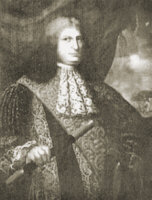 Cornelis Speelman, Admiral and later
Governor-General. Speelman left the Netherlands as a
teenager and spent the rest of his life in the Indies,
never returning.
Cornelis Speelman, Admiral and later
Governor-General. Speelman left the Netherlands as a
teenager and spent the rest of his life in the Indies,
never returning.
VOC
expedition under Speelman lands at Butung, and clears
the island of Gowa forces.
Speelman
expedition forces the Sultan of Tidore (now free of
Spanish presence) to submit to the VOC. A peace treaty
is signed between Ternate and Tidore, now both under VOC
control.
The
future Amangkurat II begins seeking VOC help against his
father.
English
give up claims to Banda in exchange for Manhattan Island
in America.
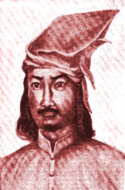
Sultan Hasanuddin of Gowa
1668
Arung
Palakka returns to Bone, sparking a popular revolt
against the Sultan of Gowa.
Speelman
expedition finally defeats Gowa.
November 18
Treaty of Bungaya: Gowa submits to VOC control, and
Sultan Hasanuddin has no influence outside the general
area of the city of Makassar.
VOC
extends claims to Sumbawa and Flores after the defeat of
Gowa.
Bugis
leaving the confusion on Sulawesi found Samarinda on
Kalimantan.
VOC
builds a fort at Menggala in Lampung.
By
this time, the Portuguese in Makassar and Gowa had fled to
Flores, or even to Macao or Thailand.
1669
Sultan
Hasanuddin of Gowa passes away; continuing troubles
against the VOC in Gowa finally end.
VOC
traders at Banjarmasin are massacred.
^










